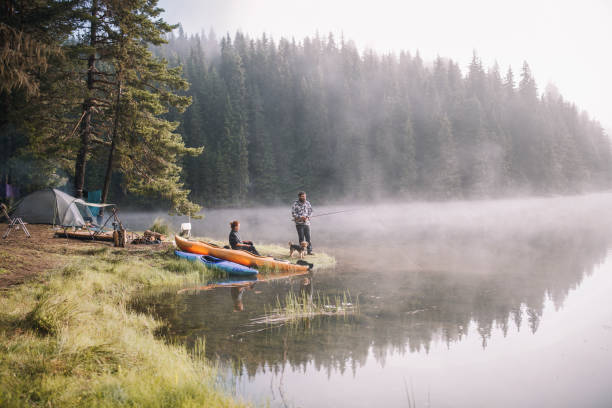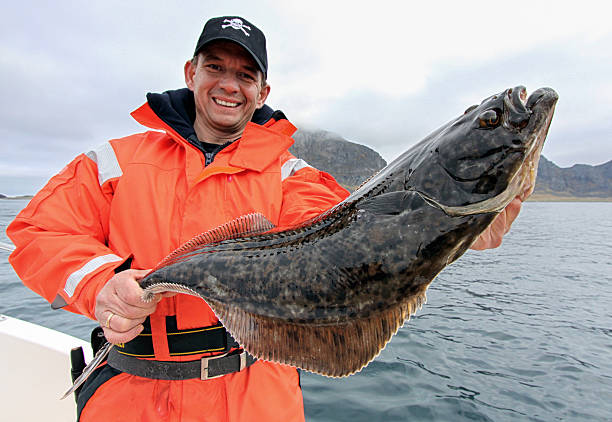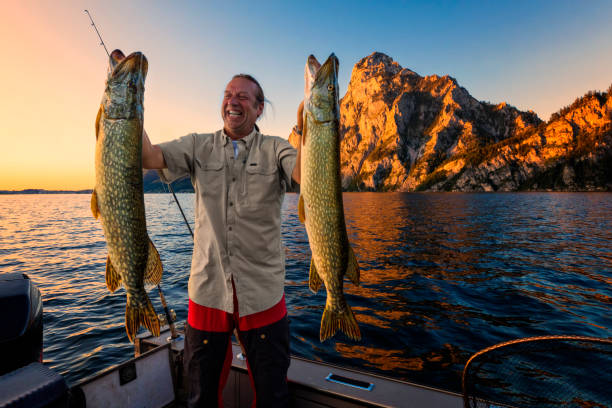The deep ocean is a place teeming with fascinating and breathtaking marine life that only a select few get the opportunity to explore. Participating in deep sea fishing can provide an unparalleled experience, unlike other fishing pursuits.
What is Deep Sea Fishing
Deep-sea fishing is a very different experience from any other type of fishing. It takes place in the deep sea, and it’s what you would call “high-risk, high-reward” fishing. There are some things to know before you go out there on your own, though!
You may also like: Fishing Basics

Considerations Before You Go
There are several things to consider when planning a trip for deep-sea fishing. First, the proper equipment must be supplied. A decent amount of money will have to be invested in enjoying your time at sea. You can hire a boat captain, or you can rent one yourself.
Even some boat captains will allow you to fish on their boats if you pay a small fee. Second, be sure to check the weather before going out. Deep-sea fishing requires calm seas to ensure your safety. An experienced captain will know which weather is good for deep water fishing and which isn’t.
What You Need To Bring
Here are some things you’ll need before heading out into the deep. It’s probably a good idea to bring your equipment, like rod and reel combos. Also, one thing that will be very helpful has pliers or fishing line cutters on hand, so you don’t have to try and pull hooks out of fish mouths with your hands. You can also bring a net to help land the fish, but most captains will have nets.

What Are Some Different Fish?
Some common deep-sea fish you might catch in your time out on the water include: grouper (red and yellow)
- Black and white snapper
- Bluefish, red drum (reds)
- Mackerel
- Amberjack
- Blackfin tuna
- Yellowfin tuna
- Barracuda

How to Prepare for a Deep Sea Fishing Trip
The experience of fishing in the deep sea is unlike any other, so there are some things you should prepare for before you go out. You’ll need to pack snacks and water, know your destination, and be ready for anything that might happen while you’re at sea. Our helpful guide will give you all the information you need before making this unforgettable voyage!
Tips for Beginners
The first thing you need to know is that there are no fish near the surface in a deep sea because it’s too dark, and they only come up when they’re hungry. Secondly, if you’re going deep water fishing, make sure to bring a small flashlight to see what you’re doing and to attract the fish. Thirdly, use smaller hooks, bait, or lighter lines because your catch will be much larger than anything else you’ve ever caught before!
Finally, always remember that the deeper you go into the water, the faster everything moves. There are few things more satisfying than catching a deep-sea kingfish.
You may also read: How to Set Up a Fishing Pole

The Best Time of Year to Go Deepsea Fishing
The best time of year to go deepsea fishing is during the summer months because that’s when these fish migrate closer to shore. You’ll also want to make sure that you bring lots of snacks and drinks with you because this will help keep your energy up.
How to Dress
You might need to dress up in protective gear before going deep-sea fishing because it can get freezing out at sea. In addition, be sure to bring extra clothes with you because your clothes will get wet if you fall into the ocean. Be sure that there are no holes in your clothing either, or else you will end up getting wet even if you don’t fall.
You may find this helpful: Best Fishing Boots and Waders – 2021 Reviews

How to Prepare Your Fishing Gear
You’ll need to make sure that your equipment is in good condition before you leave home. Check all of the hooks and lures for any damage, and if there are any tears in your line, you might want to replace it because it could break while you’re out at sea. This is an excellent time to make sure your batteries are fully charged and that the sonar is working properly.
Before you go out there, here are some helpful tips:
- Always use a light line if possible because the line gets heavier as the water gets deeper.
- Be careful with knots because they can come undone due to pressure and movement in the water.
- Use natural bait so that your bait sinks instead of floating on top of the water.
- Get your bait to the bottom by using a weight or sinker before casting out your line to the bottom.
- Always dress appropriately! Wearing clothes that won’t get snagged on something or leave you exposed to the elements will help keep you comfortable while keeping your catch safe. The only exception will be if you’re going into colder waters where layers are more appropriate.
- Some fish prefer to bait while others prefer lures, but it’s always best to use both just in case one doesn’t work as well as expected. Fishing with just one type of bait means that the fish are much more likely to ignore it completely, which is always a bummer when you’re trying to catch something.
- Know your limits and don’t try and fight the sea and win. If you get seasick easily or can tire out quickly, go with a buddy and take the necessary precautions. It’s always safety first when it comes to deep-sea fishing.
- Survey your surroundings before you start fishing so that you know what you’re getting yourself into. This helps to avoid things like dangerous water and other traps and hazards, and it lets you get better results in the end since everything is right where you want it.
- Have a good time! It can be easy to get caught up in the moment and not realize how much time has passed but don’t forget that this is supposed to be fun. Don’t worry about missing out on something or catching a specific type of fish.
- Just enjoy yourself and relax, and your catch will take care of itself.
- Be it deep-sea fishing or any other type of fishing, always remember to maintain optimal safety measures. Being conscious of your surroundings and taking proper precautions can help keep you safe and enable you to enjoy the experience more thoroughly.
Some bait ideas include:
- Fish such as small mackerel, squid, cuttlefish, and herring.
- Squid is a good choice because it is readily available and easy to prepare.
Conclusion
Though this list is by no means exhaustive, these are some important things for anyone thinking about trying their hand at deep-sea fishing for the first time. Did you catch something?





